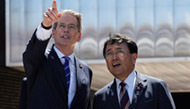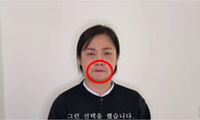I also believe he was sincere when he told audiences, again and again across his presidency, that a sweeping unilateral move like the one just made on immigration would betray the norms of constitutional government.
So how did we get from there to here? How did the man who was supposed to tame the imperial presidency become, in certain ways, more imperial than his predecessor?The scope of Obama’s moves can be debated, but that basic imperial reality is clear. Even as he has maintained much of the Bush-era national security architecture, this president has been more willing to launch military operations without congressional approval; more willing to trade in assassination and deal death even to American citizens; and more aggressive in his war on leakers, whistle-blowers and journalists.
At the same time, he has been much more aggressive than Bush in his use of executive power to pursue major domestic policy goals . on education, climate change, health care and now most sweepingly on immigration.
Three forces . two external, one internal . might help explain how this transformation happened.
First, public expectations. Across the last century, the presidency’s powers have increased in a symbiosis with changing public expectations about the office. Because Congress is unsexy, frustrating and hard to follow, mass democracy seems to demand a single iconic figure into whom desires and aspirations and hatreds can be poured. And so the modern president, the Cato Institute’s Gene Healy has written, is increasingly seen as “a soul nourisher, a hope giver, a living American talisman against hurricanes, terrorism, economic downturns and spiritual malaise.”And pressure on this talisman to act, even in violation of laws or norms or Burkean traditions, is ever increasing and intense. When presidents aren’t seen as “doing something,” they’re castigated as lame ducks; when they take unilateral action, as we’ve seen in the last week of media coverage, they suddenly seem to get their groove back. And that’s something that even a principled critic of executive power can find ever harder to pass up.
Second, congressional abdication. This is the point that liberals raise, and plausibly, in President Obama’s defense: It isn’t just that he’s been dealing with an opposition party that’s swung to the right; it’s that this opposition doesn’t know its own mind, collectively or sometimes even individually, and so has trouble bargaining or legislating effectively.
This reality has made it harder to cut major bipartisan deals; it’s made it harder to solve problems that crop up within existing law; it’s made it harder for the president to count votes on foreign policy. All of which creates more incentives for presidential unilateralism: In some cases, it seems required to keep the wheels turning; in others, it can be justified as the only way to get the Big Things done.
Which bring us to the third factor in the president’s transformation: his own ambitions. While running for president, Obama famously praised Ronald Reagan for changing “the trajectory of America” in a way that Bill Clinton’s triangulation did not. And it’s his self-image as the liberal Reagan, I suspect, that’s made it psychologically impossible for this president to accept the limits that his two predecessors eventually accepted on their own policy-making ability.
That transformative self-image has shaped his presidency from the beginning: Obama never really looked for domestic issues where he might be willing to do a version of something the other party wanted . as Bush did with education spending and Medicare Part D, and Clinton did with welfare reform. (He’s had a self-admiring willingness to incorporate conservative ideas into essentially liberal proposals, but that’s not really the same thing.)But the liberal Reagan idea has shaped his choices more as it’s become clear that certain major liberal priorities . a big climate-change bill, a comprehensive amnesty . are as out of legislative reach as health care reform proved for Clinton and Social Security reform for Bush. Confronted with those realities, Clinton pivoted and Bush basically gave up. But Obama can’t accept either option, because both seem like betrayals of his promise, his destiny, his image of himself.
And so he has chosen to betray himself in a different way, by becoming the very thing that he once campaigned against: an elected Caesar, a Cheney for liberalism, a president unbound.
스마터리빙
more [ 건강]
[ 건강]이제 혈관 건강도 챙기자!
[현대해운]우리 눈에 보이지 않기 때문에 혈관 건강을 챙기는 것은 결코 쉽지 않은데요. 여러분은 혈관 건강을 유지하기 위해 어떤 노력을 하시나요?
 [ 건강]
[ 건강]내 몸이 건강해지는 과일궁합
 [ 라이프]
[ 라이프]벌레야 물럿거라! 천연 해충제 만들기
 [ 건강]
[ 건강]혈압 낮추는데 좋은 식품
[현대해운]혈관 건강은 주로 노화가 진행되면서 지켜야 할 문제라고 인식되어 왔습니다. 최근 생활 패턴과 식생활의 변화로 혈관의 노화 진행이 빨라지고
사람·사람들
more
[송년행사 화보] “이웃과 함께 나누고 지인과 함께하니 행복”
KYCC13일 윌튼 플레이스 초등학교에서 열린 ‘한인타운청소년회관(KYCC) 홀리데이 카니발’이 성황리에 막을 내렸다. 올해는 KYCC 창립 …

[송년행사 화보] “ ‘손에 손잡고’ 한 해 마무리… 건강과 행복 기원”
전주고·북중남가주 전주고·북중 총동창회(회장 백규종)의 2025년 정기총회 및 송년회가 지난 14일 LA 작가의 집에서 성황리에 열렸다. 이날…
[송년행사 화보] “한 해를 마무리하며… 화기애애…
LA 러너스클럽LA 러너스클럽(회장 김두병)은 13일 작가의 집에서 80여명의 회원과 가족이 참석한 가운데 송년회를 마쳤다. 2007년 창립된…
[송년행사 화보] “웃음과 감사 가득 ‘훈훈’… …
한국학교총연합회미주한국학교총연합회(회장 이영숙)가 주최한 제43회 장기 근속교사 포상 및 송년의 밤 행사가 140여명의 교사들이 참석한 가운데…
[송년행사 화보] “친구야 반갑다… 선배님들 모두…
경남중고경남중·고등학교 남가주 동창회(회장 예해덕)는 지난 6일 송년회를 열고 동문 및 가족 60여 명이 참석한 가운데 끈끈한 우정을 확인했다…
많이 본 기사
- ‘AI 인프라구축 속도전’ 위한 인허가 개편 법안, 하원 통과
- 경찰, ‘통일교 금품수수 의혹’ 전재수 오늘 피의자 소환
- 트럼프, 대마초 규제 완화…헤로인과 같은 1급서 3급으로 하향
- 美·英 10대소년 유가족, 메타 상대 소송… “미성년 성착취 방치”
- 트럼프 “차기 연준 의장 몇주내 발표…3∼4명과 얘기 중”
- 독이 된 박나래 영상..문장 끝 꾹 닫힌 입까지 분석 “리스크 관리 최대”
- 방미 위성락 “진전있었다…정상합의 후속조치 서두르기로”
- 워싱턴DC 대표 공연장 케네디센터 명칭 ‘트럼프-케네디센터’로
- 위기의 트럼프 “내년봄 최대규모 세금… 1
- 에어 프레미아 취항, 기대 컸나
- 노스캐롤라이나주 공항서 商用항공기 추락… “7명 사망”
- 67명 숨진 워싱턴 여객기·軍헬기 충돌에 정부 ‘책임 인정’
- 보건부, 미성년자 성전환 의료 차단 추진… “자금지원 중단”
- 11월 소비자물가 2.7%↑ 선방했지만… “자료부족해 구멍숭숭”
- 2026년형 기아 쏘렌토, 2025 IIHS충돌 평가 최고 등급(TOP SAFETY PICK+) 획득
- 기아 텔루라이드, 뉴스위크 선정 ‘2026년 가장 기대되는 신차’ 리스트 등재
- 尹, 계엄군 장성들에 “미안”…계엄엔… 1
- LA 소파이 스테디엄 8경기 확정
- ‘라도♥’ 에이핑크 윤보미, 손편지로 결혼 발표..9년 열애 결실 “함께하기로”
- 어느덧 20주년.. ‘5남매 가족’ 이동국♥이수진, 세월 잊은 비주얼
- 트럼프, 美 사이버안보 총괄 NSA국장에 조슈아 러드 지명
- LA산불 여파 ‘심각’ 지역 주민 건강악화
- ‘무려 94.2%’ 안세영 새 역사 썼다, 역대 단일 시즌 ‘女 최고 승률’
- ‘브라운대 총기참사’ 뉴욕 한인학생도 총상
- 변정수, 갑상선암→성대결절 고백 “거의 죽음을 경험했다”
- 韓국방부 “美와 핵잠수함 연료공급 협상 2년 내 완료 목표”
- 워싱턴 일원 소비 확 줄어들었다
- 내년 봄 새 앨범→대규모 월드투어..방탄소년단, 완전체 컴백 앞두고 글로벌 음악시장 ‘놀라운 영향력’
- 브라운대 한인학생, 총격참사 극적 생존
- “김혜성만큼은 받지 않을까” 송성문 포스팅 D-3, ML 스카우트도 낙관했다
- 크리스마스 연휴 겨울폭풍 남가주 연안 2~4인치 비
- “왜 한국 자산 미국으로 옮겨야 하나… 1
- 미일, ‘日 5천500억 달러 대미… 1
- “보이스피싱 이렇게 당한다”
- “금리 대폭인하 신봉자”…트럼프가 곧 낙점할 연준 차기의장 누구
- 경찰, 통일교 자금줄 쥔 한학자 前비서실장 13시간 조사
- 美, ‘네타냐후 체포영장·조사’ 국제형사재판소 판사 제재
- “북VA 주택시장 가격 급등 없다”
- “판공비 1만달러 전액 반환하겠다” 3
- 백악관, ‘인플레둔화’ 지표에 반색… “바이든 위기와 극명 대비”
- [윌셔에서] 잠시 멈추어 서서
- 중고차 주행거리 조작 ‘주의보’
- 하원, ‘트럼프 베네수엘라 군사작전 저지 결의’ 무산
- 뱅크오브호프, 규모도 1위·봉사활동도 ‘으뜸’
- [로터리] 지멘스가 만드는 미래 동네
- 엡스타인 ‘공범’ 옛 연인 “공정한 재판 못받았다” 석방요구 청원
- [수잔 최 변호사의 LIFE &] AI 시대 편리함에 안주하지 말자
- 강경화 주미대사 신임장 제정 트럼프,… 1
- 거래 더디지만 균형 회복… 리얼터닷컴 내년 주택시장 전망
- 구글-메타, 엔비디아 독주 막으려 ‘오월동주’…AI칩 SW개발 협력
1/5지식톡

-
 ☝️해외에서도 가능한 한국어 선생님…
0
☝️해외에서도 가능한 한국어 선생님…
0이 영상 하나면 충분합니다!♥️상담신청문의♥️☝️ 문의 폭주로 '선착순 상담'만 진행합니다.☎️ : 02-6213-9094✨카카오톡ID : @GOODEDU77 (@골뱅이 꼭 붙여주셔야합니다…
-
 테슬라 자동차 시트커버 장착
0
테슬라 자동차 시트커버 장착
0테슬라 시트커버, 사놓고 아직 못 씌우셨죠?장착이 생각보다 쉽지 않습니다.20년 경력 전문가에게 맡기세요 — 깔끔하고 딱 맞게 장착해드립니다!장착비용:앞좌석: $40뒷좌석: $60앞·뒷좌석 …
-
 식당용 부탄가스
0
식당용 부탄가스
0식당용 부탄가스 홀세일 합니다 로스앤젤레스 다운타운 픽업 가능 안녕 하세요?강아지 & 고양이 모든 애완동물 / 반려동물 식품 & 모든 애완동물/반려동물 관련 제품들 전문적으로 홀세일/취급하는 회사 입니다 100% …
-
 ACSL 국제 컴퓨터 과학 대회, …
0
ACSL 국제 컴퓨터 과학 대회, …
0웹사이트 : www.eduspot.co.kr 카카오톡 상담하기 : https://pf.kakao.com/_BEQWxb블로그 : https://blog.naver.com/eduspotmain안녕하세요, 에듀스팟입니다…
-
 바디프렌드 안마의자 창고 리퍼브 세…
0
바디프렌드 안마의자 창고 리퍼브 세…
0거의 새제품급 리퍼브 안마의자 대방출 한다고 합니다!8월 23일(토)…24일(일) 단 이틀!특가 판매가Famille: $500 ~ $1,000Falcon: $1,500 ~ $2,500픽업 & 배송직접 픽업 가능LA…
케이타운 1번가
오피니언
 수잔 최 한미가정상담소 이사장 가정법 전문 변호사
수잔 최 한미가정상담소 이사장 가정법 전문 변호사 [수잔 최 변호사의 LIFE &] AI 시대 편리함에 안주하지 말자
 김도년 성균관대 건축학과 교수 스마트도시·건축학회장
김도년 성균관대 건축학과 교수 스마트도시·건축학회장 [로터리] 지멘스가 만드는 미래 동네

[여명] 금붕어를 키우는 오지선다형 수능
 허경옥 수필가
허경옥 수필가 [윌셔에서] 잠시 멈추어 서서
 양홍주 / 한국일보 논설위원
양홍주 / 한국일보 논설위원[지평선] 판다 없는 일본

[왈가 왈부] 쿠팡 김범석 “글로벌 CEO라 불출석”… ‘맹탕’ 청문회 불보듯
 정숙희 논설위원
정숙희 논설위원칠레에서 영국까지, 27년을 걷다
 마크 A. 시쎈 / 워싱턴포스트 칼럼니스트
마크 A. 시쎈 / 워싱턴포스트 칼럼니스트 [마크 A. 시쎈 칼럼] MAGA와 ‘힘에 바탕한 외교정책’
 김동찬 시민참여센터 대표
김동찬 시민참여센터 대표 [미국은 지금] 위기의 시대, 사회안전망은 최후의 방어선이다
1/3지사별 뉴스

‘브라운대 총기참사’ 뉴욕 한인학생도 총상
▶총상 입은 상황서도 동료학생 의식 잃지않도록 도와 ▶부친도 동문 “우리 가족에게 고통스러운 일”지난 13일 발생한 브라운대학교 총기난사(본보…
뉴욕주 안락사 합법화 초읽기 호쿨, “안전장치 마련되면 서명”

워싱턴 일원 소비 확 줄어들었다
올해 8월 워싱턴DC에 범죄와의 전쟁을 명분으로 주방위군이 본격적으로 배치된 가운데, 이 시기 이후부터 버지니아와 메릴랜드, DC 등 워싱턴 …
“북VA 주택시장 가격 급등 없다”

베이지역 스포츠팀, SF 한인회에 후원금
샌프란시스코 베이지역 한인회(회장 김한일)는 한인 메이저리거 이정후 선수의 소속팀인 샌프란시스코 자이언츠(San Francisco Giants…
불자커뮤니티 20일 청소년발표회및 송년회

오늘 하루 이 창 열지 않음 닫기 



















































.png)


댓글 안에 당신의 성숙함도 담아 주세요.
'오늘의 한마디'는 기사에 대하여 자신의 생각을 말하고 남의 생각을 들으며 서로 다양한 의견을 나누는 공간입니다. 그러나 간혹 불건전한 내용을 올리시는 분들이 계셔서 건전한 인터넷문화 정착을 위해 아래와 같은 운영원칙을 적용합니다.
자체 모니터링을 통해 아래에 해당하는 내용이 포함된 댓글이 발견되면 예고없이 삭제 조치를 하겠습니다.
불건전한 댓글을 올리거나, 이름에 비속어 및 상대방의 불쾌감을 주는 단어를 사용, 유명인 또는 특정 일반인을 사칭하는 경우 이용에 대한 차단 제재를 받을 수 있습니다. 차단될 경우, 일주일간 댓글을 달수 없게 됩니다.
명예훼손, 개인정보 유출, 욕설 등 법률에 위반되는 댓글은 관계 법령에 의거 민형사상 처벌을 받을 수 있으니 이용에 주의를 부탁드립니다.
Close
x